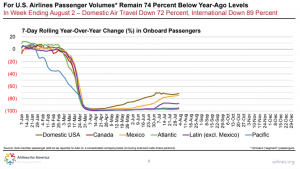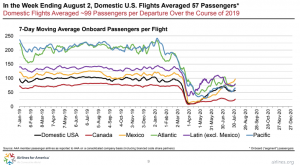70,000+ small businesses have permanently closed their doors.
The demise of big retailers has accelerated, with JCPenney, Men’s Wearhouse, and Brooks Brothers all entering bankruptcy.
Prom wear companies were also hit hard, with Occasion Brands also a victim.
The airline industry is mired in a deep slump, with passenger volumes down to a quarter of pre-COVID levels.

That’s driven by both far fewer flights, and far fewer passengers on each plane.

Air travel reductions affect other businesses…
- taxi ridership and rideshare services
- on-airport concessions, food, retail, and services (these account for 2/5ths of airport revenue)
- hotel and restaurant activity is lower with far fewer business travelers and vacationers
- airplane maintenance requirements are greatly reduced – along with the need for mechanics, spare parts, and consumables (fuel, lubricants, etc)
- airplane orders are way down and many have been cancelled, impacting the airplane industry – and the thousands of suppliers dependent on it.
- In June, Boeing had a single order for one jet, while losing 183 orders due to cancellations or likely cancellations.
And energy – in a slump to begin the year, got crushed with fallout continuing.
Its not all bad news; in general larger companies are doing better – if they aren’t in retail, energy, air travel or tourism. Of course exceptions abound; WalMart is doing just fine, thank you as are big box home improvement stores.
For workers comp, the implications are significant;
- lower premiums due to lower payroll
- tougher to return injured employees to work due to cutbacks
- fewer claims require fewer services
- insurers focused on energy, Main Street businesses and retail will be hit hardest


